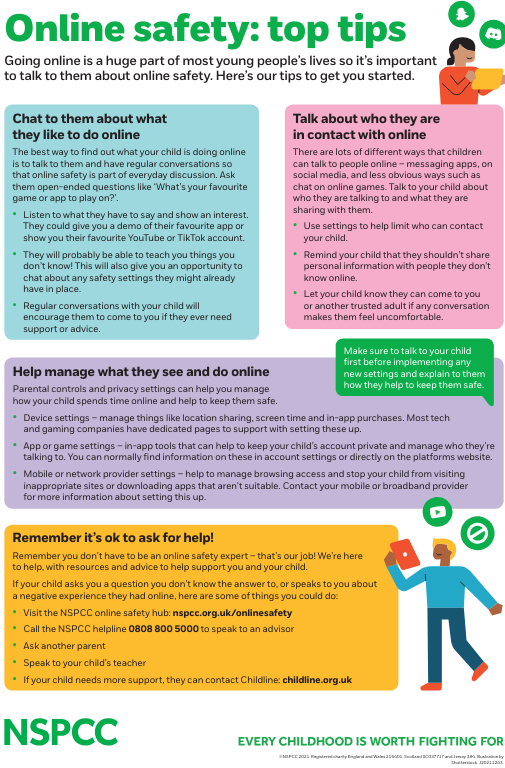Online Safety
The internet is a wonderful invention and, when used correctly, can change lives. However, just like in the real world, everyone online must remember how to behave as part of a community. Children are frequently exposed to content which is not age appropriate despite child locks and parental controls. These tools are vital but can not be solely relied upon. As adults, we have a duty to protect children from being exposed to this content and other online users who are choosing not to behave appropriately.
It is important to have regular conversations about staying safe online and to encourage children to speak to you if they come across something worrying online.
Talk to your child about the importance of creating a safe online environment, including keeping any log-in details and passwords safe. Talk to them about how they interact with others and how they would want to be treated. Cyberbullying is a crime.
At Beechview, we teach the children about online safety through assemblies, PSHE and computing lessons as well as visits from the NSPCC and members of the Thames Valley Police.
NSPCC Advice for parents

Resources
There are a lot of resources available to support discussions around online safety. Check out the following websites and links for further information.
NSPCC - Talking to your child about online safety
DfE - Support for parents and carers to keep children safe online
Childnet - Advice and resources to help talk about life online
Childnet - Screen time & Healthy Balance
UK Safer Internet Centre - Parent and Carers
UK Safer Internet Centre - Advice about key social media platforms and apps
Internet Matters - TikTok app safety – What parents need to know
Video Games
Please click on the links below to find out information about the video games your children play. In addition, the site explains where to find the most up-to-date information for setting parental controls on consoles and explains how PEGI ratings work.
Parent Zone - PEGI ratings
Sexting & Sharing Nudes
It may feel awkward, but it's important to explain to children the risks of sexting, how to stay safe and remind them that they can talk to you if something ever makes them feel scared or uncomfortable.
The National Society for the Prevention of Cruelty to Children (NSPCC) has information about sexting on its website:
NSPCC - Keeping Children Safe
Cyberflashing
Cyber-flashing is when someone sends an explicit picture, uninvited, to a device (such as your phone or tablet) by WiFi or Bluetooth. It's most likely to happen on public transport or in crowded places. Read the factsheet below to get more information on how to keep your child safe from cyber-flashing, and what to do if it happens to them. Under the Online Safety Act 2023, cyber-flashing is illegal.
Sextortion
Unfortunately, this is a growing crime and more people need to be aware of it to prevent being exploited. Sextortion is a cybercrime where individuals are coerced into sharing explicit images or videos. Perpetrators often threaten to release these materials publicly unless their demands are met.
Anyone can be a victim, and so we urge parents to be highly aware of their children's online interactions. There are several agencies that offer advice to anyone who has been exposed, including the Thames Valley Police. Check out their website for more information. There is also a useful infographic for you down below.

